19 start with O start with O

The need to understand and address large-scale environmental problems that are difficult to study in controlled environments—issues ranging from climate change to overfishing to invasive species—is driving the field of ecology in new and important directions. Observation and Ecology documents that transformation, exploring how scientists and researchers are expanding their methodological toolbox to incorporate an array of new and reexamined observational approaches—from traditional ecological knowledge to animal-borne sensors to genomic and remote-sensing technologies—to track, study, and understand current environmental problems and their implications.
The authors paint a clear picture of what observational approaches to ecology are and where they fit in the context of ecological science. They consider the full range of observational abilities we have available to us and explore the challenges and practical difficulties of using a primarily observational approach to achieve scientific understanding. They also show how observations can be a bridge from ecological science to education, environmental policy, and resource management.
Observations in ecology can play a key role in understanding our changing planet and the consequences of human activities on ecological processes. This book will serve as an important resource for future scientists and conservation leaders who are seeking a more holistic and applicable approach to ecological science.
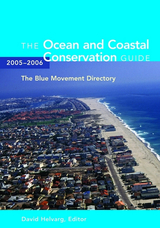
A new environmental movement is emerging to help combat threats to America's oceans and coasts, with hundreds of local and regional groups as well as dozens of national and international organizations being formed. The Ocean and Coastal Conservation Guide represents a comprehensive guide to this new "Blue Movement."
This one-of-a-kind new reference details more than 2,000 organizations and institutions that are working to understand, protect, and restore our ocean and coastal areas. For each entry, the book gives contact information including phone and fax numbers, email addresses, web addresses and a brief description of program areas of interest. Along with the state-by-state listings of groups, the directory includes three detailed sections that identify relevant government agencies, academic marine programs, and marine and coastal parks and protected areas.
To be published biennially, The Ocean and Coastal Conservation Guide is a vital new resource for anyone interested in the growing community of people working to protect and restore our coastal lands and waters.
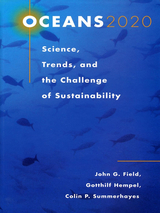
Oceans 2020 presents a comprehensive assessment of the most important science and societal issues that are likely to arise in marine science and ocean management in the next twenty years. Sponsored by the Intergovernmental Oceanographic Commission (IOC), the Scientific Committee on Oceanic Research (SCOR), and the Scientific Committee on Problems of the Environment (SCOPE), the book brings together the world's leading ocean scientists and researchers to analyze the state of marine science and technology, identify key scientific issues for sustainable development, and evaluate the capability of scientists, governments, and private-sector stakeholders to respond to those issues. Topics include:
- basic ocean sciences
- pressures on the coastal zone
- climate change and the ocean
- fisheries and fishery science in their search for sustainability
- offshore industries including oil drilling, carbon sequestration, and manganese nodule mining
- marine information for shipping and defense
Oceans 2020 suggests what can be done about major marine environmental issues through the better development and application of marine science and technology, focusing on the issues that are most closely related to human and sustainable development. It will help guide countries in developing their marine science and technology strategies and priorities and is an essential source of information for policymakers, government officials, resource managers, scientists, the media, and all those concerned with the current and future health of the oceans.

The concept of environmental security, drawing on the widely understood notion of international strategic interdependence (in facing, for example, threats of nuclear war or economic collapse) is gaining currency as a way of thinking about international environmental management.
In 1989, the Institute for World Economy and International Relations of the Russian Academy of Sciences and the Marine Policy Center of Woods Hole Oceanographic Institution instituted a joint project to examine environmental security as it applies to the world's oceans. The Oceans and Environmental Security is a unified expression of their findings.
The oceans, as global commons, are of central importance to issues of international environmental security. Critical problems are those that are likely to destabilize normal relations between nations and provoke international countermeasures. As such, the book focuses on seven specific concerns:
- land-based marine pollution
- North Pacific fisheries depletion
- hazardous materials transport
- nuclear contamination
- the Arctic Ocean
- the Southern Ocean and Antarctica
- the Law of the Sea
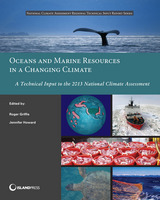
Prepared for the 2013 National Climate Assessment and a landmark study in terms of its breadth and depth of coverage, Oceans and Marine Resources in a Changing Climate is the result of a collaboration among numerous local, state, federal, and nongovernmental agencies to develop a comprehensive, state of the art look at the effects of climate change on the oceans and marine ecosystems under U.S. jurisdiction.
This book provides an assessment of scientific knowledge of the current and projected impacts of climate change and ocean acidification on the physical, chemical, and biological components and human uses of marine ecosystems under U.S. jurisdiction. It also provides assessment of the international implications for the U.S. due to climate impacts on ocean ecosystems and of efforts to prepare for and adapt to climate and acidification impacts on ocean ecosystem, including
· Climate-Driven Physical and Chemical Changes in Marine Ecosystems
· Impacts of Climate Change on Marine Organisms
· Impacts of Climate Change on Human Uses of the Ocean
· International Implications of Climate Change
· Ocean Management Challenges, Adaptation Approaches, and Opportunities in a Changing Climate
· Sustaining the Assessment of Climate Impacts on Oceans and Marine Resources
Rich in science and case studies, it examines the latest climate change impacts, scenarios, vulnerabilities, and adaptive capacity and offers decision makers and stakeholders a substantial basis from which to make informed choices that will affect the well-being of the region’s inhabitants in the decades to come.


Old Fields brings together leading experts from around the world to synthesize past and current work on old fields, providing an up-to-date perspective on the ecological dynamics of abandoned land. The book gives readers a broad understanding of why agricultural land is abandoned, the factors that determine the ecological recovery of old fields, and how this understanding contributes to theoretical and applied ecology.
Twelve case studies from diverse geographical and climatic areas—including Australian rainforest, Brazilian Amazonia, New Jersey piedmont, and South African renosterveld—offer a global perspective on the causes and results of land abandonment. Concluding chapters consider the similarities and differences among the case studies, examine them in the context of ecological concepts, and discuss their relevance to the growing field of restoration ecology.
Old Fields is the first book to draw together studies on old fields from both a theoretical and practical perspective. It represents an important contribution to the development of theory on old field dynamics and the practice of ecological restoration on abandoned farmland, and the broader implications of old field dynamics to ecology and restoration.
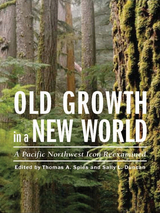
Old Growth in a New World untangles the complexities of the old growth concept and the parallel complexity of old-growth policy and management. It brings together more than two dozen contributors—ecologists, economists, sociologists, managers, historians, silviculturists, environmentalists, timber producers, and philosophers—to offer a broad suite of perspectives on changes that have occurred in the valuing and management of old-growth forests in the Pacific Northwest over the past thirty years. The book
• introduces the issues and history of old-growth values and conservation in the Pacific Northwest;
• explores old growth through the ideas of leading ecologists and social scientists;
• addresses the implications for the future management of old-growth forests and considers how evolving science and social knowledge might be used to increase conservation effectiveness.
By confronting the complexity of the old-growth concept and associated policy and management challenges, Old Growth in a New World encourages productive discussion on the future of old growth in the Pacific Northwest and offers options for more effective approaches to conserving forest biodiversity.
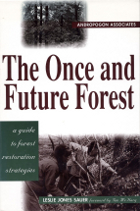
Developed by the pioneering landscape design firm of Andropogon Associates, world-renowned for their innovative approach to integrating environmental protection and restoration with landscape architecture and design, The Once and Future Forest is a guidebook for restoring and managing natural landscapes. Focusing on remnant forest systems, it describes methods of restoring and linking forest fragments to recreate a whole landscape fabric.
The book begins by explaining the history and current situation of forest ecosystems in the eastern United States. Following that is an in-depth examination of the restoration process, with thorough descriptions of ecological strategies for landscape management along with specific examples of how those strategies have been implemented in various sites around the country. The final section provides hands-on information about the many specific details that must be considered when initiating and implementing a restoration program. All aspects of the restoration process are considered, including: Water -- opportunities for increasing infiltration, reducing pollutants, promoting habitat values Ground -- methods of protecting existing vegetation, removing fill, rebuilding soils Plants -- strategies and procedures for planting, maintenance, propagation Wildlife -- guidelines for preserving wildlife resources, management techniques to favor selected specie.
The Once and Future Forest presents a comprehensive approach to assessing sites, detailed guidelines for determining management goals, and a thorough overview of appropriate management and restoration techniques. It is an important guide for professional planners and landscape architects, government agency personnel at all levels, land managers, scientists involved in restoration work, and citizen activists who wish to do something constructive about our deteriorating forest patches.
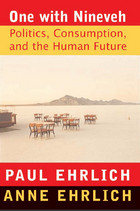
Named a Notable Book for 2005 by the American Library Association, One with Nineveh is a fresh synthesis of the major issues of our time, now brought up to date with an afterword for the paperback edition. Through lucid explanations, telling anecdotes, and incisive analysis, the book spotlights the three elephants in our global living room-rising consumption, still-growing world population, and unchecked political and economic inequity-that together are increasingly shaping today's politics and humankind's future. One with Nineveh brilliantly puts today's political and environmental debates in a larger context and offers some bold proposals for improving our future prospect.

Americans are voting with their feet to abandon strip malls and suburban sprawl, embracing instead a new type of community where they can live, work, shop, and play within easy walking distance. In The Option of Urbanism visionary developer and strategist Christopher B. Leinberger explains why government policies have tilted the playing field toward one form of development over the last sixty years: the drivable suburb. Rooted in the driving forces of the economy—car manufacturing and the oil industry—this type of growth has fostered the decline of community, contributed to urban decay, increased greenhouse gas emissions, and contributed to the rise in obesity and asthma.
Highlighting both the challenges and the opportunities for this type of development, The Option of Urbanism shows how the American Dream is shifting to include cities as well as suburbs and how the financial and real estate communities need to respond to build communities that are more environmentally, socially, and financially sustainable.

Paul Shepard has been one of the most brilliant and original thinkers in the field of human evolution and ecology for more than forty years. His thought-provoking ideas on the role of animals in human thought, dreams, personal identity, and other psychological and religious contexts have been presented in a series of seminal writings, including Thinking Animals, The Tender Carnivore and the Sacred Game, and now The Others, his most eloquent book to date.
The Others is a fascinating and wide-ranging examination of how diverse cultures have thought about, reacted to, and interacted with animals. Shepard argues that humans evolved watching other animal species, participating in their world, suffering them as parasites, wearing their feathers and skins, and making tools of their bones and antlers. For millennia, we have communicated their significance by dancing, sculpting, performing, imaging, narrating, and thinking them. The human species cannot be fully itself without these others.
Shepard considers animals as others in a world where otherness of all kinds is in danger, and in which otherness is essential to the discovery of the true self. We must understand what to make of our encounters with animals, because as we prosper they vanish, and ultimately our prosperity may amount to nothing without them.
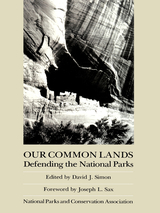
This accessible book explains the complexities of key environmental laws and how they can be used to protect our national parks. It includes discussions of successful and unsuccessful attempts to use the laws and how the courts have interpreted them.
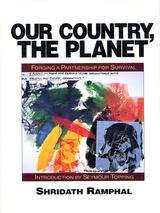
Our Country, The Planet is a wide-ranging discussion of the global environmental crisis that accounts for the positions and perceptions of both developed and developing nations. As president of the World Conservation Union and the only person to have served on all five independent international commissions on global issues, Shridath Ramphal brings to his study a unique perspective and deep understanding of both development and the environment.

The next few decades will see a profound energy transformation throughout the world. By the end of the century (and perhaps sooner), we will shift from fossil fuel dependence to rely primarily on renewable sources like solar, wind, biomass, and geothermal power. Driven by the need to avert catastrophic climate change and by the depletion of easily accessible oil, coal, and natural gas, this transformation will entail a major shift in how we live. What might a 100% renewable future look like? Which technologies will play a crucial role in our energy future? What challenges will we face in this transition? And how can we make sure our new system is just and equitable?
In Our Renewable Future, energy expert Richard Heinberg and scientist David Fridley explore the challenges and opportunities presented by the shift to renewable energy. Beginning with a comprehensive overview of our current energy system, the authors survey issues of energy supply and demand in key sectors of the economy, including electricity generation, transportation, buildings, and manufacturing. In their detailed review of each sector, the authors examine the most crucial challenges we face, from intermittency in fuel sources to energy storage and grid redesign. The book concludes with a discussion of energy and equity and a summary of key lessons and steps forward at the individual, community, and national level.
The transition to clean energy will not be a simple matter of replacing coal with wind power or oil with solar; it will require us to adapt our energy usage as dramatically as we adapt our energy sources. Our Renewable Future is a clear-eyed and urgent guide to this transformation that will be a crucial resource for policymakers and energy activists.
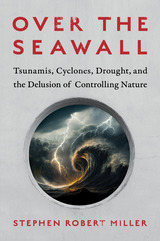
Never have so many undertaken such a widespread, hurried attempt to remake the world. Predictably, our hubris has led to unintended—and sometimes disastrous—consequences. Academics call it maladaptation; in simple terms, it’s about solutions that backfire. Over the Seawall tells us the stories behind these unintended consequences and about the fixes that can do more harm than good. From seawalls in coastal Japan, to the reengineered waters in the Ganges River Delta, to the artificial ribbon of water supporting both farms and urban centers in parched Arizona, Stephen Robert Miller traces the histories of engineering marvels that were once deemed too smart and too big to fail. In each he takes us into the land and culture, seeking out locals and experts to better understand how complicated, grandiose schemes led instead to failure, and to find answers to the technologic holes we’ve dug ourselves into.
Over the Seawall urges us to take a hard look at the fortifications we build and how they’ve fared in the past. It embraces humanity’s penchant for problem-solving, but argues that if we are to adapt successfully to climate change, we must recognize that working with nature is not surrender but the only way to assure a secure future.
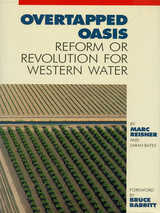
Overtapped Oasis analyzes the West's water allocation system from top to bottom and offers dozens of revolutionary proposals for increased efficiency and policy reform. Marc Reisner and Sarah Bates argue that the West's underlying problem is not a shortage of water but the inefficient use of it, a problem caused by a bewildering tangle of federal subsidy programs, restrictive state water codes, anachronistic irrigation practices and -- perhaps most important -- resistance to reform.

Overtourism: Lessons for a Better Future charts a path toward tourism that is truly sustainable, focusing on the triple bottom line of people, planet, and prosperity. Bringing together tourism officials, city council members, travel journalists, consultants, scholars, and trade association members, this practical book explores overcrowding from a variety of perspectives. After examining the causes and effects of overtourism, it turns to management approaches in five distinct types of tourism destinations:
1. historic cities;
2. national parks and protected areas;
3. World Heritage Sites;
4. beaches and coastal communities; and
5. destinations governed by regional and national authorities.
While each location presents its own challenges, common mitigation strategies are emerging. Visitor education, traffic planning, and redirection to lesser-known sites are among the measures that can protect the economic benefit of tourism without overwhelming local communities.
As tourism revives around the world, these innovations will guide government agencies, parks officials, site managers, civic groups, environmental NGOs, tourism operators, and others with a stake in protecting our most iconic places.
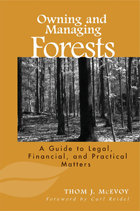
Owning and Managing Forests is both an accessible overview of the privileges, rights, and obligations that accompany forest ownership and a guidebook to help active forest owners and managers use laws to their advantage and avoid the pitfalls of expensive and exhausting litigation. The book is a revised, expanded, and updated edition of Legal Aspects of Owning and Managing Woodlands, published in 1998 by Island Press and named Best Forestry Book of the Year by the National Woodland Owners Association.
This edition provides current information on recent changes in property, environmental, and tax laws, while also discussing new directions in forest management. It offers expanded treatment of topics including private property, searching property records, easements, estate planning, timber sale contracts, working with forestry professionals, and how to pass woodlands intact to future generations. The book also describes the many different facets of trusts, changes in forestland taxation methods, and new licensing and certification options. Included, too, is a section on avoiding disputes and how to use alternative dispute resolution methods to avoid costly, troubling, and time-consuming court battles.
Owning and Managing Forests provides clear and concise descriptions of often confusing concepts and difficult subjects, and addresses issues in a competent yet conversational tone. Anyone involved with owning or managing forestland will find the book an essential guide and reference.
READERS
Browse our collection.
PUBLISHERS
See BiblioVault's publisher services.
STUDENT SERVICES
Files for college accessibility offices.
UChicago Accessibility Resources
home | accessibility | search | about | contact us
BiblioVault ® 2001 - 2024
The University of Chicago Press









